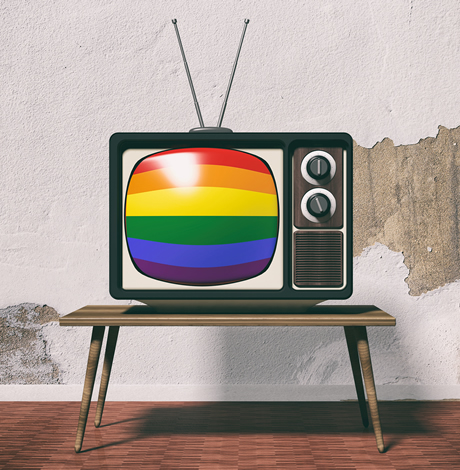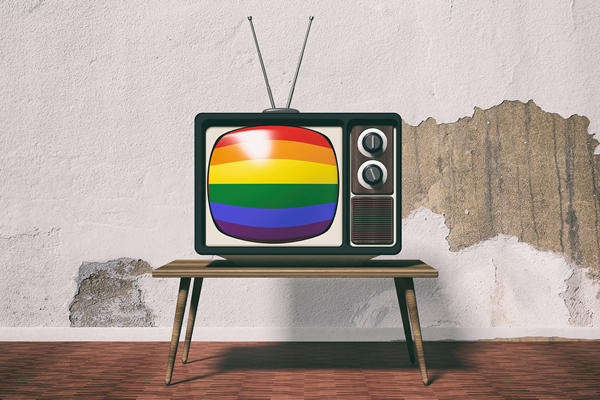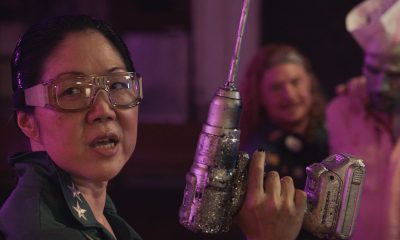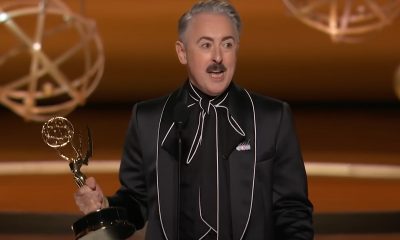Arts & Entertainment
TV ready to unleash array of LGBT themes, characters
Prominent critics on their most-anticipated new shows


Several new gay-friendly television shows are on the way.
At the recent television critics press tour, there were many new gay-friendly television shows intriguing critics. The Los Angeles Blade’s Susan Hornik talked with LGBT journalists about their take on the new shows.
Trish Bendix, managing editor at INTO
Most excited about “VIDA,” from queer Latinx playwright-turned-TV writer Tanya Saracho. Not only does the show have an all Latinx writers room and Latinx actors, but the plotline and several major characters are LGBTQ. Rarely do we see Latinx leads on TV, and this is a Starz show which means it will be gritty, sexy and boundary-pushing.
Also, Alan Cumming-starrer “Instinct” will also be of interest, though I’m concerned with CBS’s not-so-great track record on LGBTQ inclusion. Still, having an out bisexual man playing a gay lead on a primetime network show is pretty exciting.
Jim Colucci, author of the 2016 New York Times best-seller ‘Golden Girls Forever’
The depictions of LGBT characters are more plentiful and more well-rounded than the days of “The Golden Girls,” which was a LGBT favorite at that time. Back then, the occasional guest character would be gay or lesbian or there would be a gay-themed joke — and certainly there was a gay sensibility about any show that starred a Broadway legend like Bea Arthur.
FX’s’ “Pose” is a recreation of the late ’80s Harlem drag ball era from the prolific gay TV mogul, Ryan Murphy. Trans portrayals are still in short supply on TV, but “Pose” brings us a wide variety of queer characters and it’s both fun and fearless.
Even on network TV, the most mainstream you can get in America’s entertainment universe, gay characters are now not just being accepted, but are featured as lead characters. I’m particularly looking forward to seeing more of NBC’s “Champions,” about the philandering owner of a Brooklyn gym who is suddenly presented with the son — half Indian-American and all fabulously gay — he never knew he had.
Other shows have featured gay teens before — memorably, “Glee,” again from Ryan Murphy — but I love how “Champions” capitalizes on the fabulousness of its funny and appealing teen actor, J.J. Totah. NBC’s drama “Rise,” set in the drama department of a working-class Pennsylvania high school, is worth checking out. Although in adapting their source material, the book, “Drama High” by Michael Sokolove, “Rise’s producers changed Josh Radnor’s lead character of drama teacher Lou to be straight rather than gay, the series does feature several students facing issues with being trans and coming out.
Even though I’m still wary of the change, I realize this series, set in the gayest-friendly of places a high school can offer, its drama department — has the chance to say something really interesting, meaningful and ultimately, entertaining.
John Griffiths, executive director, GALECA: the Society of LGBTQ Entertainment Critics
“Instinct,” with Alan Cumming as network TV’s first gay character to top an hour drama, should be a kick, given the star’s unique charms (and he was more than good on “The Good Wife”). Should be a cheeky kick — he tracks serial killers, teaches at a university and writes books (Whoopi Goldberg plays his editor). He also rides a motorcycle. How butch.
Curious to see how the new Paramount Network’s reboot of the Winona Ryder/Christian Slater cult classic “Heathers” turns out. In this series version of the teen-horror comedy, one of the three titular cliquish high school meanies happens to be gay. The snark is played by out newcomer Brendan Scannell, who, judging by the witty banter he tossed at the show’s TCA panel, has a serious future in comedy. Another potential standout here: Lilli Birdsell, hilarious in clips as the super-pert white mom to a black Heather (Jasmine Mathews).
It’s not rife with LGBTQ characters, but “American Woman” (also on Paramount, formerly Spike TV) with Alicia Silverstone has lots of allure. Silverstone was adorable in “Clueless,” sure, but also terrifically weird in the recent Colin Farrell/Nicole Kidman thriller, “The Killing of a Sacred Deer.”
And her role here — a dutiful wife and mom who ditches her cad of a husband to belatedly join the feminist movement in the early ‘70s — is irresistible. Gay heartthrob Cheyenne Jackson (“30 Rock”) co-stars as the love interest of Silverstone’s BFF, played by Mena Suvari. The show comes with an authentic vibe and cinematic look, surprising considering it’s created by “Real Housewives” fixture, Kyle Richards (it’s based, in fact, on her mom’s own life trajectory).
Steve Gidlow, TV, MediaVillage
In an age where all that is old is new again, it’s refreshing to see the upcoming new installments of ABCs “Roseanne” tackling a sensitive issue like gender fluidity. With Darlene back at home caring for Dan and Roseanne, her parents are faced with Darlene’s young son Mark (Ames McNamara) who his experimenting with his fashion style and outward appearance — all much to grandpa Dan’s chagrin.
Even in its heyday, “Roseanne” was never a show that shied away from big social issues so it’s refreshing this reboot is tackling the issue of letting a young person explore what makes them happy head on, even though it might make those closest to them less than comfortable.
Malcolm Venable, TVGuide.com, senior editor, West Coast
“Pose” — Only Ryan Murphy could sell a network on a story that juxtaposes the New York City ‘80s ballroom scene with the uptown upper crust elite of the Reagan era, while hiring a record number of trans talent in front of and behind the camera. It looks gorgeous and the first footage we saw at TCA included scenes that looked like note-for-note recreations of moments from “Paris Is Burning,” which — no joke — made my heart flutter.
“9-1-1”— Angela Bassett’s husband coming out to her as gay (in the first episode) but the high camp that Murphy’s team, Brad Falcuck, Tim Minear and the uber fierce Alexis Martin Woodhall (seriously Google her) put together. That translates to seeing the emergency response team, which includes Peter Krause, Aisha Hinds and Kenneth Choi.
“Versace” is essential television. Lush, vivid, intensely terrifying and relevant for its messages. Great performances from Judith Light, Penelope Cruz and Edgar Ramirez but Darren Criss is life-changing. And, surprise: don’t expect much Versace. It’s about Andrew Cunanan.
“2 Dope Queens” — Jessica Williams and Phoebe Robinson take their podcast to the stage for a limited-episode run on HBO. They’re authentic and revelatory to their experience as black women, but as the packed multi-cultural New York City audiences show, their stories are universal covering nerd life, boy troubles and of course Beyonce. It’s hilarious and they represent hard for their LGBTQ fam.
Photos
PHOTOS: Sydney Gay and Lesbian Mardi Gras Parade
48th annual LGBTQ event held in Australian city

The 48th annual Sydney Gay and Lesbian Mardi Gras Parade was held on Feb. 28.
(Photos by Cori Mitchell)




















a&e features
35 years after ‘Truth or Dare,’ Slam is still dancing
Salim Gauwloos on Madonna, HIV, and why he almost didn’t audition for Blond Ambition Tour

Most gay men of a certain age remember “the kiss.”
It was the moment Madonna’s dancers Salim Gauwloos and Gabriel Trupin locked lips in the hit 1991 documentary film “Truth or Dare,” which is celebrating its 35th anniversary this spring.
The kiss was hot, but what made it groundbreaking is that it appeared in a mainstream Hollywood movie that screened in suburban multiplexes across the country. This wasn’t an obscure art house film. The movie, and tour on which it was based, received months of breathless media attention all over the world for bold expressions of female empowerment and queer visibility. Madonna was threatened with arrest in Toronto for simulating masturbation on stage and Pope John Paul II urged Catholics to boycott the show, triggering a media firestorm.
“Truth or Dare” was billed as a behind-the-scenes documentary of the tour, but it quickly became clear that the real star of the show wasn’t Madonna, but rather her colorful troupe of seven backup dancers, six of whom identified as gay: Kevin Stea, Carlton Wilborn, Luis Xtravaganza Camacho, Jose Gutierez Xtravaganza, Gauwloos, and Trupin; Oliver Crumes III identifies as straight.
We saw them party and march in the New York City Pride parade. They were unabashedly queer at a dangerous time — before protease inhibitors began to stem the AIDS plague and before most celebrities and politicians embraced the gay community in any real way. Being out in 1991 carried major risks to career and reputation.
Enter Gauwloos, one of those brave dancers who vogued his way into the hearts of countless gay men entranced by his handsome looks, his stage presence, and dance skills.
Gauwloos — known then and now as “Slam”— sat down with the Blade to talk Madonna, the lasting impact of “Truth or Dare,” the public disclosure of his HIV status, and plans for a new book on his life.
His story is fascinating — from growing up in Europe to dancing in New York to landing the gig of a lifetime with Madonna. He performed on that tour while secretly HIV positive and went without medical treatment for 10 years because he was living in the United States as an undocumented immigrant. Not even Madonna knew of his HIV status. Two other dancers on the tour were also HIV positive but no one talked about it. Ironically, Madonna was singing “Express Yourself” and advocating for condom use during her concerts yet backstage three of her dancers were secretly positive.
“A lot of people were dying so I wasn’t going to tell Madonna I had HIV,” said Slam, now 57. “And the others didn’t either. It wasn’t the moment to do it. She used to make speeches about Keith Haring and AIDS and I thought it’s going to be me next.”
Gabriel Trupin died of AIDS in 1995. Slam was diagnosed at age 18 in 1987, a frightening time when a positive test result often meant a death sentence. He booked the “Blond Ambition Tour” at age 21 after moving to New York. His friends encouraged him to audition but Slam resisted because he wasn’t a big Madonna fan.
“It was crazy, everyone wanted that job,” he said, “but I wanted to dance with Janet Jackson and Paula Abdul.” He listened to his friends and shortly after the audition, Slam received a call from Madonna herself inviting him to join the tour.
“We all wanted to be stars but not even Madonna knew how big that tour would become. The way it was choreographed and directed, the stars aligned. … It never looks dated even today.”

The world tour kicked off in Japan in April 1990 then moved to the United States and Europe, stirring controversy wherever it went. There was the iconic cone bra; the aforementioned simulated masturbation during “Like a Virgin”; and religious imagery that offended many Catholic groups and the Vatican.
And the controversy didn’t end with the tour. Cameras were rolling throughout the tour for what Slam thought would be a “video memory” for Madonna. But as the tour unfolded, director Alek Keshishian reportedly became more interested in what was happening behind the scenes so plans for mere tour footage were expanded into a full documentary.
“We were young and partying and didn’t really know what was going on,” Slam said. “You live in this celebrity bubble and you sign a paper – I don’t even know what I signed.”
In 1992, Kevin, Oliver, and Gabriel sued Madonna for invasion of privacy and fraud claiming she used some footage without their consent. They claim they were told nothing would be included in the film that they didn’t want to be seen. In one specific incident, Gabriel alleged that he told producers he didn’t want the scene of him kissing Slam to be in the film as he wasn’t fully out.
“Gabriel was forcibly outed,” in the movie, Kevin said in a 2016 interview.
Slam did not join his colleagues in the lawsuit.
“I couldn’t sue because I was illegal but I wasn’t ever going to sue,” Slam said. “I’m not a suing kind of person. But good for them, they fought for it and won. A lot of people don’t have the balls to sue Madonna.” The suit was settled two years later for an undisclosed sum.
“We were all conflicted about the kiss,” he said with a laugh. “The kiss, oh my God, my boyfriend is going to kill me! Belgian stress!”
Beyond worrying about his boyfriend’s reaction, Slam had concerns about the impact of being openly gay on his modeling career.
“In 1990, you couldn’t get high fashion campaigns as an openly gay model,” he said. “I was worried about that. I couldn’t get a campaign because I was gay. My agency told me to say I was straight and it was just a game.”
In 2016, pegged to the 25th anniversary of “Truth or Dare,” the surviving six dancers filmed a documentary about their lives post-Madonna titled “Strike A Pose.” In it, Slam publicly revealed his HIV status for the first time in an emotional scene with his former colleagues.
“I found the strength to tell the world I have HIV,” he recalls. “I was scared but I felt brave. The outcome and messages were beautiful. After I saw ‘Strike A Pose,’ I knew we gave people hope. And not just for gay people.”
He was infected in 1987 but didn’t get treated until 1997. After the tour ended, he said he went into a depression and his agency dropped him.
“I was partying too much after the tour,” he recalls. “I made a decision to live as an illegal alien.” In 1997, Slam collapsed and was rushed to the hospital with pneumonia.
“They started treating me and thank God the new HIV drugs were out, the cocktails, it took me a couple months to get better.”
Madonna didn’t participate in “Strike A Pose” and Slam said he hasn’t seen or spoken to her since the end of the tour. He said he had no idea of the impact “Truth or Dare” would have.
“You look at this movie in 1991 and you don’t think it’s going to be such a big thing and 35 years later it’s still helping people,” he said. “It was helpful for people who felt alone at that time. It was such an important documentary.
“I don’t think younger gay people realize how important Madonna was to gay and queer visibility — she was a big part of it. We showed the world it’s OK to be gay and that was the great message of this movie.”
He noted that, decades later, many of his friends have transgender kids and that queer culture is represented in much of mainstream pop culture.
“It’s amazing how far we’ve come,” he said. “I know we’ll always be marginalized but we have come so far. I’m really proud of our community. The current nightmare will be over and I do believe that things will get better.”
Referencing President Trump’s attacks on the LGBTQ community and crackdown on immigration, Slam described the situation in the U.S. today as “sad.”
“Everything is such a mess,” he said. “Some of these people have lived here 30-40 years and they take you out of your home. I can’t even imagine. It breaks my heart. When I was illegal it was a different story.”
Slam met his husband, Facundo Gabba, who’s from Argentina, in 2000, and he helped him get a legal case together to win citizenship. He filed a case in 2001 and was told there was a 99 percent chance he wouldn’t be permitted to stay in the United States because they weren’t allowing HIV-positive immigrants to remain in the country. But he got his green card anyway in 2005 and became a U.S. citizen in 2012.
Today, Slam and Gabba live in Brooklyn, though they travel a lot because “I can’t take the cold.” The couple married in Argentina in 2010 and in the U.S. in 2016.
Slam is still dancing and working as a choreographer. He’s teaching at a contemporary dance festival in Vienna in July and even offers online lessons via Salimdans.com.
As a longtime HIV survivor, Slam is dedicated to a healthful lifestyle.
“You have to keep moving; when you move you stay healthy,” he says. “Dance heals everything. I do yoga, I eat healthy and clean as possible. I don’t watch much TV … I try to stay healthy and positive. If I absorb all of the negativity I would be sick.”

In addition to his ongoing work in dance and choreography, Slam is in the early stages of writing a book about his extraordinary life and pioneering career.
“I always knew I had a book inside of me. I want to talk about my HIV status. I know I can inspire more people. I want to tell even more secrets in the book; secrets are a poison so I want to tell everything.”
Among those secrets, he notes, is a desire to write about his strict Muslim father and the years he spent as an undocumented immigrant in America.
“Those are the things I want to talk about, the struggles. It’s a love story, hope and resilience. I know it will help people.”
As for his friends from the tour, Slam says he remains in contact with Gabriel’s mother and José Xtravaganza is his best friend. Baltimore’s Center Stage theater is currently developing a new musical about Xtravaganza’s life. And Slam said he occasionally talks to Oliver, though “he still can’t pronounce Sandra Bernhard’s name.”
At the end of our interview, Slam indulged a round a rapid fire questions:
• Favorite song to perform in the “Blond Ambition” tour? “Express Yourself.”
• Aside from Madonna, who was your favorite artist you worked with? Toni Braxton in “Aida” on Broadway.
• Favorite Madonna song? “Live to Tell”
• Favorite Madonna video? “Bedtime Stories”
• What’s more stressful: performing in a concert or performing on the VMAs? “Both, because we always had to be perfect.”
• Did you go to Madonna’s recent “Celebration” tour? “I didn’t see the show but I saw clips online.”
• What do you remember most about performing “Vogue” at the VMAs? “It was nerve-racking for them to flip those fans.”
• When was the last time you vogued? “I teach classes so a couple weeks ago.”
Books
Love or fear flying you’ll devour ‘Why Fly’
New book chronicles a lifetime obsession with aircraft

‘Why Fly’
By Caroline Paul
c. 2026, Bloomsbury
$27.99/256 pages
Tray table folded up.
Check. Your seat is in the upright position, the airflow above your head is just the way you like it, and you’re ready to go. The flight crew is making final preparations. The lights are off and the plane is backing up. All you need now is “Why Fly” by Caroline Paul, and buckle up.

When she was very young, Paul was “obsessed” with tales of adventure, devouring accounts written by men of their derring-do. The only female adventure-seeker she knew about then was Amelia Earhart; later, she learned of other adventuresome women, including aviatrix Bessie Coleman, and Paul was transfixed.
Time passed; Paul grew up to create a life of adventure all her own.
Then, the year her marriage started to fracture, she switched her obsession from general exploits to flight.
Specifically, Paul loves experimental aircraft, some of which, like her “trike,” can be made from a kit at home. Others, like Woodstock, her beloved yellow gyrocopter, are major purchases that operate under different FAA rules. All flying has rules, she says, even if it seems like it should be as freewheeling as the birds it mimics.
She loves the pre-flight checklist, which is pure anticipation as well as a series of safety measures; if only a relationship had the same ritual. Paul loves her hangar, as a place of comfort and for flight in all senses of the word. She enjoys thinking about historic tales of flying, going back before the Wright Brothers, and including a man who went aloft on a lawn chair via helium-filled weather balloons.
The mere idea that she can fly any time is like a gift to Paul.
She knows a lot of people are terrified of flying, but it’s near totally safe: generally, there’s a one in almost 14 million chance of perishing in a commercial airline disaster – although, to Paul’s embarrassment and her dismay, it’s possible that both the smallest planes and the grandest loves might crash.
If you’re a fan of flying, you know what to do here. If you fear it, pry your fingernails off the armrests, take a deep breath, and head to the shelves. “Why Fly” might help you change your mind.
It’s not just that author Caroline Paul enjoys being airborne, and she tells you. It’s not that she’s honest in her explanations of being in love and being aloft. It’s the meditative aura you’ll get as you’re reading this book that makes it so appealing, despite the sometimes technical information that may flummox you between the Zen-ness. It’s not overwhelming; it mixes well with the history Paul includes, biographies, the science, heartbreak, and exciting tales of adventure and risk, but it’s there. Readers and romantics who love the outdoors, can’t resist a good mountain, and crave activity won’t mind it, though, not at all.
If you own a plane – or want to – you’ll want this book, too. It’s a great waiting-at-the-airport tale, or a tuck-in-your-suitcase-for-later read. Find “Why Fly” and you’ll see that it’s an upright kind of book.
The Blade may receive commissions from qualifying purchases made via this post.




















